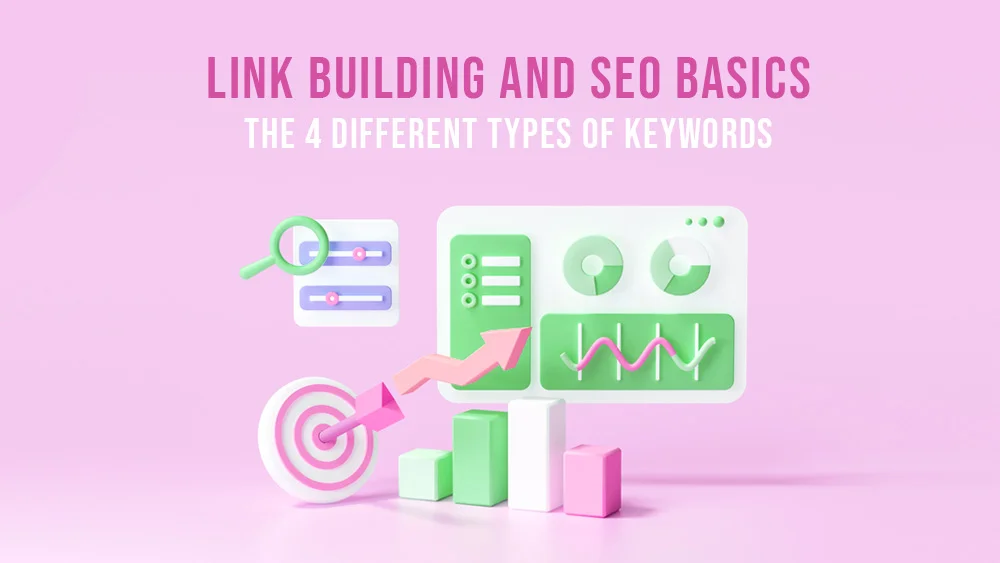Link Building and SEO Basics: The 4 Different Types of Keywords
Link Building and SEO Basics: The 4 Different Types of Keywords
Building backlinks and making strategic use of keywords are two of the most important factors. Ones that you should consider when trying to optimize a website for search engines. In this guide, we will cover the fundamentals of link building. Additionally, look into the four distinct types of keywords that can each have a significant influence on your search engine optimization efforts. If you have a solid understanding of these ideas, you will be able to build a powerful presence online. Furthermore, increase the visibility of your website in the results of search engines.
What Is Link Building, and Why Is It Important for SEO?
This is the million-dollar question everyone keeps asking. Simply put, link building is the practice of gaining hyperlinks leading to your website from other websites. These links "vote" for your website. Causing them to signal to search engines that the content you provide is of high quality. This proves that your content is reliable. When it comes to the evaluation of your website's authority and credibility by search engines like Google, the greater the number of links to your website that are of high quality and relevant, the better.
This could result in higher ranks in search engine results pages (SERPs), which would lead to an increase in the amount of organic traffic and visibility your website receives. In essence, link building is vital for SEO since it assists search engines in understanding the relevance and popularity of your website, which eventually drives more traffic and potential buyers to your site.
The Four Types of Keywords That Are of Great Importance for Your SEO
Understanding the various categories of keywords is a vital component of both link building and search engine optimization. You can optimize your website more effectively by taking advantage of these keywords, which play an important part in establishing the purpose of a user's search query and can assist you in doing so. Here are the four categories of keywords:
- Informational
- Navigational
- Transactional
- Commercial investigation
We will discuss each and every type in detail in order for you to have a better understanding of the whole keyword concept.
The Different Types of Keywords: Informational Keywords

This type of keyword is simply used as a search query by people. Simply put, these keywords are used whenever a person is looking for specific information or solutions to a topic. These key phrases frequently begin with questions or statements such as "how to," "what is," or "tips for." If you want to attract readers who are looking for instructional or instructive content, optimizing your content with keywords related to information will definitely help. Keep in mind that these keywords don’t always end up starting with a question.
When it comes to the marketing funnel, informational keywords typically appear higher up. This indicates that consumers are in the preliminary stages of the purchasing process. And are consequently less inclined to take some sort of action, such as making a purchase. As a consequence of this, the conversion rate for content that is primarily informative is typically lower. However, it may assist you in raising awareness of your brand. Additionally, establish yourself as an expert in your field.
Navigational Keywords

When a user is seeking or looking for a specific website or brand, they will use the navigational keywords to find it. Many times, the name of a firm or website will be included in these terms. These keywords help a person narrow down their search options. That is why, if you optimize your website using navigational keywords, it will be easier for users to reach your site when they are looking for it explicitly.
When a business or website is well-known and popular, these keywords might be valuable sources of organic traffic because they are more likely to be searched for. Your brand name should naturally help you achieve a high ranking for the relevant set of keywords. Simple examples of navigational keywords are as follows:
- YouTube
- Where is Billy’s Diner located in Texas?
- LinkExchange Blog
The Different Types of Keywords: Transactional Keywords
When a user is ready to complete a transaction, such as making a purchase or carrying out a certain action, they will employ transactional keywords. These keywords and phrases frequently include phrases like "buy," "order," or "sign up." Using transactional keywords to optimize your website can help you attract users who are ready to convert into customers.
Because they are most likely to be utilized by someone near the end of the purchase funnel, transactional keywords are often referred to as buyer keywords. That indicates that these keywords have a significant amount of value when conducting keyword research and building an SEO or PPC strategy. Transactional keywords, as a general rule, provide a more precise description of a product or service ("neon blue unisex watch," for example). The commercial category is appropriate for keywords with a more general focus, such as "men's watches."
Examples of transactional keywords:
- Buy NFTs
- Boba Tea places near me that deliver
Commercial Keywords AKA: Commercial Investigation Keywords
People conduct research on particular brands, products, or services by making use of commercial keywords. They might be interested in reading customer reviews, making product comparisons, or searching for promotional offers.
You can focus on these keywords by writing comparison pieces, listicles, reviews, or articles that provide instructions on how to do something. Depending on the particular term being used. These keywords provide insight into a person's future plans to make a purchase or participate in another type of business endeavor. In order for them to be able to assist you in reaching high-quality prospects.
Examples of commercial investigation keywords:
- Second Cup’s vs. Starbucks's cold brew
- Dunkin’s iced coffee flavors
How to Incorporate Keywords Into Your Link Building Strategy
- Conduct keyword research: Use tools like Google Keyword Planner or SEMrush to identify relevant keywords for your industry or niche.
- Choose the right anchor text: When building links, use anchor text that includes your target keywords. Search engines can better grasp the significance of the linked website thanks to this.
- Guest blogging: Write guest posts for reputable websites in your industry and include relevant keywords in your author bio or within the content itself.
- Internal linking: Link to relevant pages within your own website using anchor text that includes your target keywords. This aids search engines in comprehending your website's organization and hierarchy.
- Social media optimization: When sharing your content on social media platforms, use keywords in your captions, hashtags, and meta descriptions to improve visibility and reach.
- Collaborate with influencers: Partner with influencers in your industry and ask them to include your target keywords in their content or social media posts.
- Monitor and analyze: Regularly monitor your website's performance using tools like Google Analytics. Examine the keywords that are generating the most traffic and modify your strategy as necessary.
- Create high-quality content: Producing valuable and engaging content that naturally incorporates keywords will attract more organic backlinks and improve your website's visibility.
- Build relationships with other website owners: Reach out to other website owners in your industry and offer to exchange links or collaborate on content creation.
- Stay up to date with all SEO trends: SEO is constantly evolving, so it's important to stay informed about the latest best practices and algorithm updates to ensure your link building strategy remains effective.
The Benefits of Using Long-Tail Keywords in Link Building
Using long-tail keywords can bring a number of benefits when it comes to search engine optimization (SEO) and link development. Because long-tail keywords are more particular and have a lower level of competition than generic keywords, it is much simpler to rank for them in the results of a search engine. You will be able to attract a more particular audience that is currently looking for the information or items that you provide if you utilize long-tail keywords in the anchor text and content that you produce on your website.
In addition, long-tail keywords typically have higher conversion rates than shorter keywords since they imply a greater level of intent on the part of the user. In general, incorporating long-tail keywords into your strategy for link building will help boost the visibility of your website, generate relevant traffic, and raise the likelihood of driving conversions.
Bonus Tips and Tricks for Effective Link Building and Keyword Optimization
There are a few suggestions that might help you refine your approach when it comes to link building and keyword optimization. First, concentrate on producing valuable, high-quality material that will inevitably draw links from other websites.
This can entail writing insightful blog articles, carrying out original research, or making interesting films. As a further precaution, be sure to optimize your anchor text by including pertinent keywords that completely describe the information you are linking to. This will make your website more visible in search results by helping search engines understand the context of your links.
Finally, think about contacting other website owners or influential people in your sector to ask for links or to collaborate. Establishing connections and networking can be effective strategies for boosting the number of high-quality links referring to your website. These pointers can help you strengthen your link-building and keyword-optimization efforts, which will ultimately improve your website's search engine results and increase organic traffic.
Final Thoughts
Link building is of crucial importance for your SEO marketing strategy if you intend to strengthen your business and rank higher on Google. One of the main factors that could help you do so is researching a keyword strategy that fits your business. Making it easier for your website’s users can help you reach a larger audience in no time.
That is why we come to you with the perfect link exchange solution that will help you enhance your business strategy. Our platform helps you swap links in an effective way with different trusted networks, domains, and platforms. Sign up now and exchange links in a safe way that will help you avoid any Google penalties. Our domain is easy to use, efficient, and completely free of charge!

Comments
Post a Comment